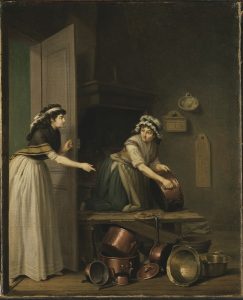One’s just reward? Servants’ wages, terms of employment and tangible assets in a changing manorial economy, 1730-1870

A woman furbishing copper pans, Pehr Hillerström d.ä. (1732-1816), Nationalmuseum, Sweden. Wikimedia Commons.
In this project, we study how different kinds of remuneration were used in order to recruit, keep, manage and govern servants in the manorial economy. During the period 1730-1870, Swedish manors gradually changed their production and the balance between consumption and home production of goods. It seems like Swedish manors increased production of textile and other products by employing more servants for home production at the estates during the 18th century, due to decreasing wages. However, our knowledge of servants’ wages; the levels as well as how they were paid, are lacking. In this project, we utilize estate archives with detailed accounting records of the estate households, in order to answer three questions. Firstly, we study the nature of servants’ remuneration at the estates. How, when and to whom were wages paid, and how were they used to control servants? We connect this to the growing field of quantitative wage studies, which often lack the details of how yearly wages actually were paid. Secondly, we study the wage levels and the tangible assets of servants employed in the estate households. How did servants’ standard of living change during this period, and how did the standard differ between unmarried servants and servants with their own households? Thirdly, we study servants’ life trajectories and recruitment strategies of the estate households. How often did servants change their employer, and what was characteristic of the smaller group of faithful old servants? This part deals with how the relationships in the households changed during this period, when servants eventually became more detached from the employing families.
The project aims to understand what the remuneration consisted of, how it was paid out and how it was used as an employers’ strategy and force in the relationship between servants and masters. We contribute to research on wages, standards of living, material culture and household relations in a changing manorial economy.
The project is financed by Handelsbankens forskningsstiftelser (P23-0080) 2024-2026. The project group consists of Carolina Uppenberg, PI, PhD in economic history, Stockholm University; Göran Ulväng, associate professor in economic history, Uppsala University; and Marie Steinrud, associate professor in ethnology and nordic history, Stockholm University.
For further information contact Carolina Uppenberg: carolina.uppenberg@ekohist.su.se